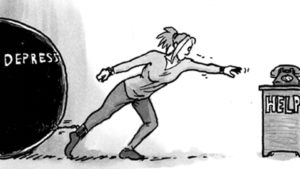A Dark State of Mind: A Closer Look at Adrien Broner, Tyson Fury & Others in the Sport of Boxing
Yesterday I woke up and checked my social media pages like I usually do and I came across one headline story that really caught my attention. A story about former Four division world champion Adrien Broner. His close friends are worried he may kill himself and have contacted police to check in on the boxer after he went on social media and strongly implied he was going to take his own life. Broner began posting early Wednesday morning apologizing to his family and friends and saying, “I don’t want to be here no more this shit too much.” He then posted a photo of a handgun inside of a vehicle and wrote, “I’m going home I love y’all.”
Recently Heavyweight Champion Tyson Fury opened up about his depression and his fight with substance abuse because of it. For prizefighters this isn’t anything new, From Frank Bruno to Ricky Hatton, to Oscar De La Hoya and Johnny Tapia the list of boxers that have struggled with depression goes on and on. Boxers put their lives on the line every time they get into the ring. Their bodies and mental health are put at risk.
Professional boxers hide their vulnerabilities and emotions to their opponent and fans watching not only in the ring, but also in their personal lives. Boxers have to be not only in top physical condition but mentally prepared as well. For many fighters boxing is all that they have. When depression hits, it hits hard. For Ricky Hatton he has stated all his accomplishments were for his fans. In a recent BBC interview Ricky talked about how his depression led him to drugs and alcohol, he was published in a British newspaper using cocaine in a hotel. After that he felt he had let down everyone and his only way out was to commit suicide. For boxers many slowly fade out of the public eye and everything they have worked their entire life for comes to a painful end. This is where depression can slowly creep up on a person without them ever noticing. Many people including myself have asked how can these fighters that are in top physical shape and that have been mentally ready for war every time they get in the ring fall into such a dark state of mind?
First off boxing as we all know is a brutal sport. I’ve always wondered what is the mentality of a person who wants to jump into a ring and get hit in the head to begin with.? What is their upbringing, their education, family life, and income like? Are they from the streets and literally fighting to survive? What is their emotional state before they ever enter the ring? Then there is the standard dementia process produced by repeated trauma to the head and as part of the dementia spectrum there are mood swings and depression. These fighters go into the ring and many pride themselves on having a great chin, and being able to withstand powerful blows while trading shots with their opponent. When a fighter is cut, has a broken bone or torn muscle it’s easily diagnosed by medical experts. When a fighter is KO’d bleeding on the brain usually occurs, yet for the most part the effects of blows to the head tend to remain undisclosed unless there is a major accident that brings an injury to our attention.
As far back as 1928, the American pathologist Harrison Stanford Martland wrote a paper entitled “Punch Drunk” in which he showed that prize fighters were suffering from brain injury caused by the rupture of blood vessels. The “Punch Drunk” condition, known more formally as chronic traumatic encephalopathy (CTE) or as its variants, dementia pugilistica or boxer’s dementia, is a neurodegenerative disease that can affect boxers and others who suffer knocks to the head. It can cause depression, aggression, impulsivity and memory loss and has been linked to suicide. When fighters get a brain injury the body to releases a distress chemical that triggers feelings of sadness, confusion, doubt and depression. Basically, it’s a distress signal. Your body telling you there’s a problem. Athletes in contact sports are more prone to depression. Recently the American Association of Neurological Surgeons estimated that 90% of boxers sustain brain injury. Head injuries some boxers sustain contribute to depression. This sometimes leads to drug use, such as cocaine, in failed attempts at feeling better.
So what the answer? Education, training promotional companies and managers on what to look for when it comes to mental health issues with their fighters. Sanctioning and governing bodies as well as state athletic commissions must also do their part in the education process. Maybe even fighters who have struggled with depression could talk to current fighters and teach classes. Another possible alternative could be a boxing hot line where a fighter could reach out to an expert in the mental health field when the early signs of depression arise. Fighters could also be forced to go through a series of mental health evaluations before they are allowed to fight. I personally don’t have all of the answers only ideas, but in today’s world of technology and social media it’s truly sad to see that more of the major players in the boxing community are allowing boxers to be stuck in such a “Dark State of Mind”
[si-contact-form form=’2′]


